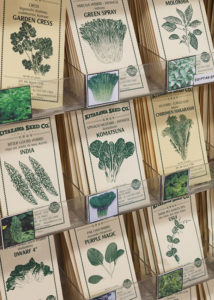Seeds at Sky: Local, Organic, Sustainable & Beyond
It’s time to think about seeds! Here in the Pacific Northwest, many vegetable and summer flower seeds can be sown indoors starting in February to get a jump start on the season. The hardiest spring veggies can even be sown right into the ground by early March.
As you begin to consult seed planting charts and plan for the season ahead, we’d like to highlight a few of the most unique seed companies that grace Sky Nursery’s seed racks in late winter and early spring. Alongside larger names like Territorial, Renee's, Botanical Interests and Ed Hume that provide excellent selection and quality in their own rights, these more niche companies each have something a little different to offer.
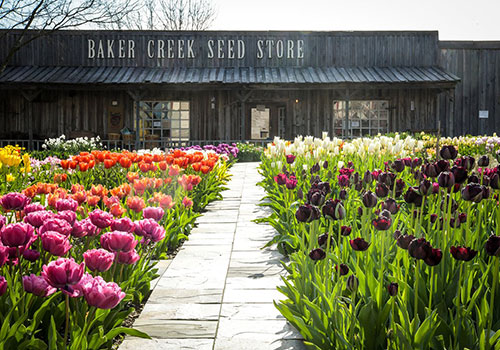
Baker Creek
On our Baker Creek seed rack, you’ll find unique and unusual heirloom varieties that have been passed down through the generations.
Baker Creek’s founder, Jere Gettle, started saving heirloom seeds in 1998, when he was just a teenager. His passion for preserving unique varieties generation after generation has flourished from there. Today, Baker Creek Heirloom Seed Company is the largest heirloom seed supplier in the United States.
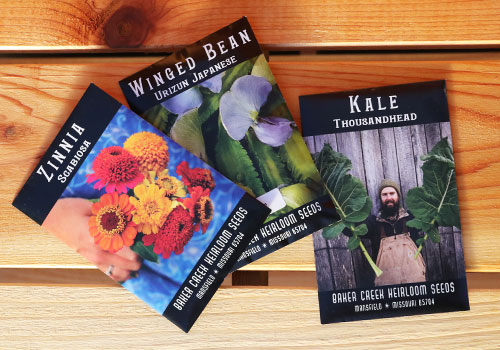
Yet the company remains grounded in the same convictions that drove Jere’s original interest: a firm belief that farmers and gardeners have a right to save their own seed, and a commitment to providing the seeds of a sustainable future to everyone.
Baker Creek has taken the Safe Seed Pledge to ensure that as the market for GMO seeds expands, their seeds will remain 100% GMO-free. Every variety they sell is open-pollinated rather than hybrid. That means you can save your own seeds from the varieties they sell, knowing they will “come true” (grow into a similar plant) the next season.
Don’t miss Baker Creek’s seeds if you love trying out and collecting unusual heirloom varieties.
Kitazawa
Kitazawa Seed Company offers over 500 varieties of Asian vegetables that can be hard to find from other sources in the United States. This includes whole categories of plants that are uncommon in Western cuisine, such as pickling melons and burdock, as well as favorite Asian varieties of more widely familiar vegetables from carrots to peas. They even provide recipes to help all gardeners prepare and enjoy their harvest!
Gijiu Kitazawa started Kitazawa Seed Company in 1917 because he wanted to bring the traditional vegetable and herb varieties he had grown in Japan to United States markets. Many of his early customers were fellow Japanese-American farmers and gardeners in his local California area.
His business, like the businesses and lives of so many other Japanese Americans, was disrupted by internment during WWII. When he relaunched the seed company, he started shipping seeds around the country in order to serve long-term customers who had been forced to relocate.
Today, traditional Asian vegetables are beginning to enjoy the widespread appreciation they deserve, and Kitazawa Seed Company is more successful than ever. Check out the Kitazawa seed rack for traditional varieties that may otherwise be hard to find.
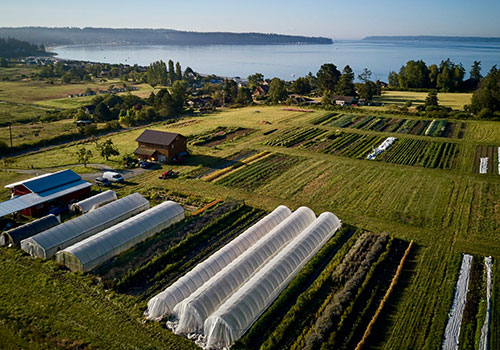
Deep Harvest
Listen up, seed fans! Deep Harvest Farm is a unique, rare, sparkly gem of a seed company that you definitely want to know about. Their seeds are 100% locally grown, 100% organic and truly sustainable, 100% open-pollinated, and 100% terrific.
In the world of seeds, it is very rare to find a company that grows, packages, and markets all of their own seeds locally. Typically, seed companies buy seeds grown by farmers throughout their region, across the country, or even around the world, and act as the bridge between seed farmers and customers. While the best of these companies source carefully and do extensive local testing and quality control, there is no way to trace exactly where their seeds came from.
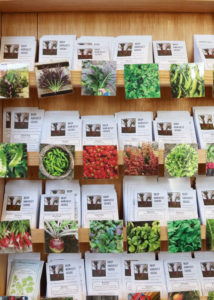
Deep Harvest Farm isn’t a typical seed company. They are a couple, Annie Jesperson and Nathaniel Talbot, and a handful of employees who grow, harvest, clean, and pack their own seeds right on their small farm on Whidbey Island. They also grow produce, which finds its way from farm to table via a farm share (community supported agriculture) program. The seed varieties they sell are the same ones they choose to grow for their own use and for sale, so you know they stand behind those selections.
Deep Harvest seeds are selected specifically to thrive in organic, low-input conditions in the Pacific Northwest, and they are grown in those conditions generation after generation. Not only is Deep Harvest Farm certified organic, they also go well beyond the standards required for certification. Besides employing beyond-organic sustainability practices like minimal tilling and deep mulching, they also support wildlife with native plant hedgerows and pollinator gardens. All of that means that their seeds are especially well-suited to thrive in local, organic gardens.
Gardeners who share Deep Harvest’s conviction that “farmers and gardeners are the proper stewards of seeds, not corporations” will be glad to know that this farm grows only open-pollinated and non-patented seeds. They call their seeds “open source” and encourage gardeners to save their own seeds to replant. Naturally, they’ve signed the Safe Seed Pledge and promise not to sell GMO seeds.
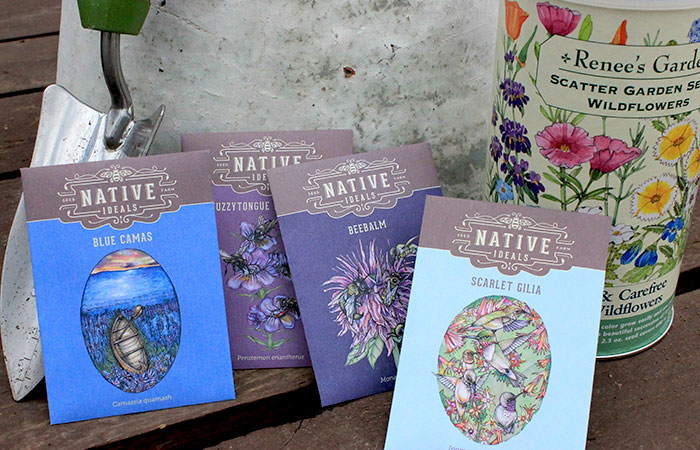
Native Ideals
This unique small farm grows and markets its own seeds directly. Like Deep Harvest Farm, Native Ideals stands out from larger seed companies, which typically buy and consolidate seed from a multitude of sources. Their specialty is wildlife-friendly and widely-adaptable wildflowers and other native plants.
Every seed that Native Ideals sells is grown and harvested right on their small, sustainable homestead. The wild ancestors of the seeds they grow were ethically and carefully hand-collected by Native Ideals, taking care to preserve their genetic diversity.
While this native seed farm is located in Montana, quite a few of the wildflowers they cultivate are native to Washington state as well. Native plants are especially valuable for native pollinators and other wildlife, who thrive when they can access the same foods they’ve relied on for millenia. Even wildflowers that aren’t native this far west can still thrive in our gardens and provide valuable nectar sources for local pollinators.
By buying Native Ideals seeds, you’re also supporting their larger visions and initiatives for a sustainable future. They both use and actively advocate for sustainable growing practices, including water conservation and habitat restoration; truly a labor of love. They believe in their seeds, and we believe they belong in your garden.
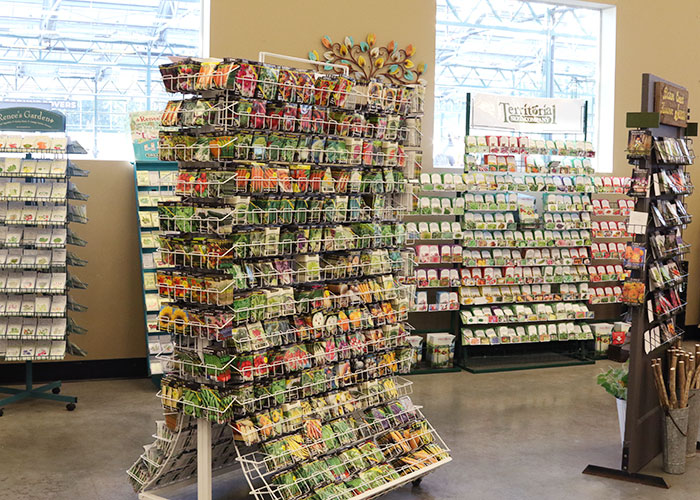
So… Sow Those Seeds!
Whether you’re starting seeds indoors, planting them directly in the ground, or a little of both, we encourage you to try planting a few seeds this season! The magic of germination is a beautiful experience for kids and grownups alike, and we can all become just a little bit more resilient when we build our own seed growing skills. Consider trying out some new-to-you varieties this year, and have fun!
Please note: Our stock changes constantly, especially since the pandemic began. If you want to confirm the availability of a specific seed company or variety, give us a call to check in advance.

